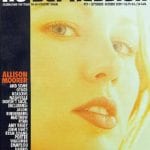Porter Wagoner – The Thin Man
“Mama said I used to go out in the yard when I was around nine or ten years old. My dad had cut down this big oak tree and left a stump there, and Mama said I’d get up on that stump and pretend I was onstage, and I’d sing a song or two and introduce my special guest, and normally it would be Roy Acuff.
“Then I’d get off the stump, go off and come around the other side, and I’d be him then. I’d sing ‘From the great Atlantic Ocean to the wide Pacific shore’ — I’d sing one of his songs, and then I’d say, ‘Porter, I’m really glad to be here with you,’ and I’d be him for a few minutes. She said I would do that for hours, and she never was worried about me leaving there, you know, because she knew that’s just what I was doing, man.”
Porter Wagoner has his own permanent dressing room at the Grand Ole Opry, a visible token of the importance he’s taken on there since the death in 1992 of the show’s longtime presiding spirit, Roy Acuff. It’s a comfortable place, with its own bathroom, a small stereo, and — in contravention of the Opry’s general no-smoking policy — a few ashtrays scattered around to accommodate the singer’s heavy cigarette habit.
Except for a few mirrors, the walls are completely covered with photos, most of them showing Porter with country music colleagues — everyone from Acuff and George Jones to Vince Gill and Travis Tritt. The star is between shows (he hosted a 7 p.m. segment of the Opry and goes back on at 9:30 tonight), and after posing for a few pictures with fans and eating a plate of nachos, he’s taken off the jacket of his purple Nudie suit and settled back in an easy chair, ready to talk.
For the best part of the past 20 years, since the end of his syndicated television show and his recording contract with RCA, Wagoner was largely content to put his career on a kind of relaxed auto-pilot, making frequent Opry appearances and playing less-frequent but still regular tour dates. Though compilations of duets he made with Dolly Parton have been issued several times, his own catalog was allowed to fall by the wayside by his former label.
Because he lacks the alt-country cachet of artists such as the Louvin Brothers, Buck Owens or Merle Haggard, domestic reissue houses haven’t taken much of an interest in re-releasing his albums, with the inexplicable (though enjoyable) exception of a 1964 live set (In Person, on Koch). Bear Family has issued a comprehensive collection of Wagoner’s early recordings, but it ends in 1962, just when things were getting really interesting. The subsequent work of one of postwar country music’s most important entertainers has been limited to the second half of one inadequate compilation (The Essential Porter Wagoner, RCA) and an obscure English twofer of late 1960s albums.
Until now, that is, at least in a narrow sense. After a long absence from the studio, Wagoner has a new album on the market, released by a young but already respected Nashville indie label (Shell Point). As a result, while the search for what legendary WSM DJ Eddie Stubbs calls “deep catalog” can still be frustrating, the number of post-1962 original Wagoner recordings easily available on CD has just doubled — and the new material is, to put it plainly, right up there with the old.
Which brings us back to Porter’s dressing room. He’s done a number of interviews lately in connection with the release of The Best I’ve Ever Been (when he looks you in the eye and tells you “that’s exactly what it is, buddy,” it’s hard to disagree), and most of them have covered the same ground: why he’s chosen to record again, the origin of the songs, and, of course, his sponsorship of and collaboration with Dolly Parton.
Naturally, then, he assumes we’re here for more of the same. But as it becomes apparent to him that there’s a wider range of subjects in view, he warms up to the job, telling stories and cracking jokes. After each punchline, he turns around to look at a couple of band members hanging out on the other side of the dressing room, gauging the effectiveness of the story by their laughter as he recalls the early days of his career and some of its many highlights.
Porter Wagoner was born in 1927, not 40 miles from Poplar Bluff, Missouri, as a duet he recorded with Parton had it, but more like 90. His dad was a farmer, but between his arthritis and the Depression and its aftermath, the farm was a losing proposition — it was sold to satisfy debts — and the family had moved into nearby West Plains by the time Porter reached his mid-teens. He was already playing guitar, taught by a sister and a brother, and singing both secular country music and gospel songs as he worked various jobs around the town.
Though Roy Acuff was an early influence, as his stump story reveals, he wasn’t the only one. “Roy Acuff, Bill Monroe and the bluegrass music that he created, they were both huge influences on me and the kind of music I liked,” he says. Bitten especially hard by the bluegrass bug — “I admired Bill Monroe so much, and I loved the high energy of his music” — he put together a band, the Blue Ridge Boys, and hit the road in his first effort to make a career in music.




